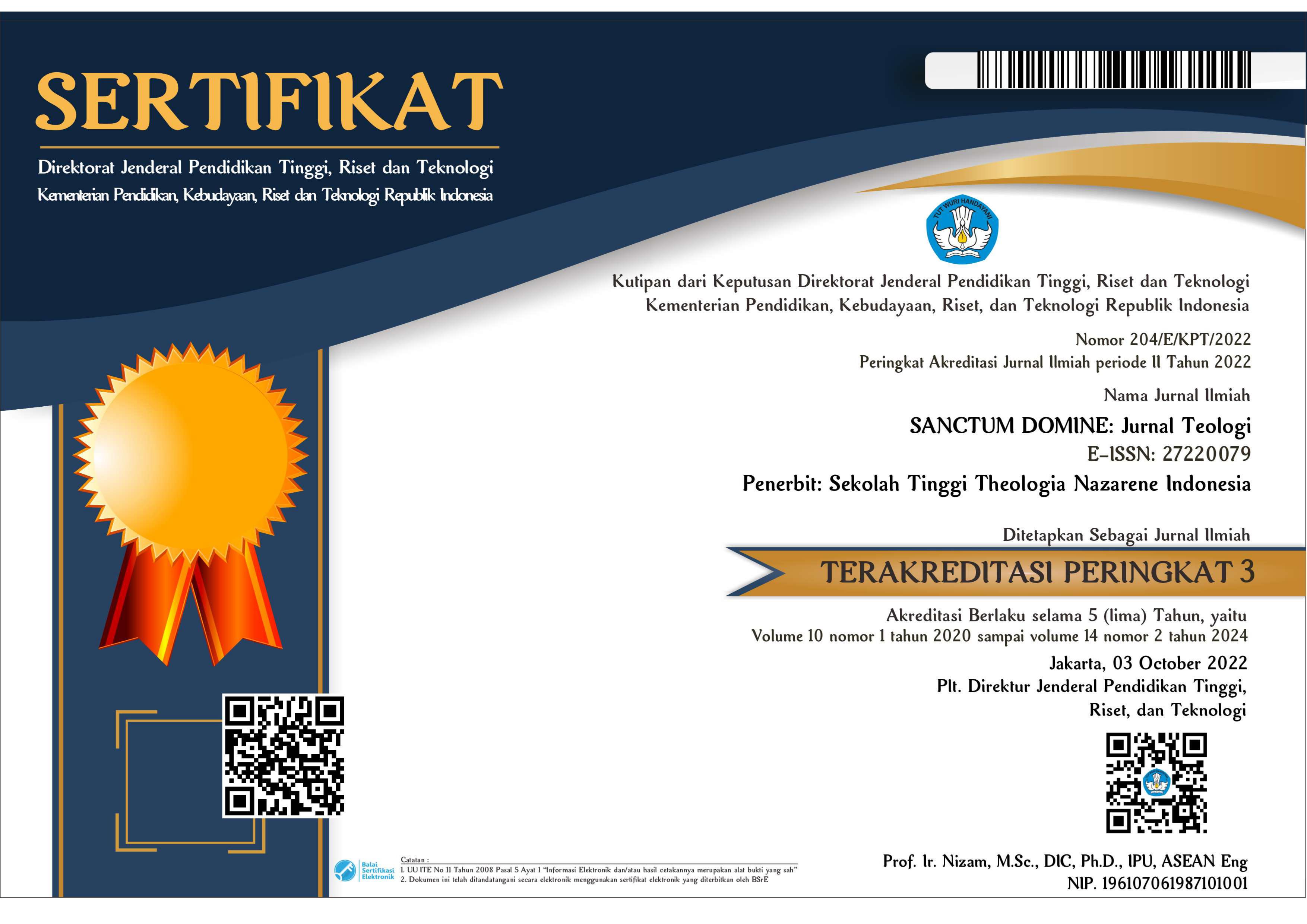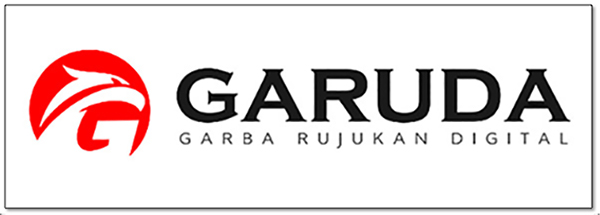Pastoral Guidance for Congregations in the Era of Society 5.0
A Proposal of Thought
Abstract
The era of Society 5.0 represents a period in which advanced technology and humans are increasingly integrated, creating significant transformations in social and cultural life. This article explores the role and challenges of pastoral counseling in the Society 5.0 era. This research employs a qualitative approach, combined with a literature review, to understand the role of pastoral counseling in the context of the Society 5.0 era. In the face of rapid technological advancements and social changes, pastoral counseling plays a key role in assisting congregations in comprehending and responding wisely to the dynamics of Society 5.0. The results of this study identify relevant approaches, such as education on technology and ethics, collaboration with technology experts, and a strong spiritual approach. Pastoral counseling that aligns with Christian values can be a robust source of support for congregations as they navigate meaningful lives in the increasingly complex Society 5.0 era.
References
Afandi, Yahya. “Gereja Dan Pengaruh Teknologi Informasi ‘Digital Ecclesiology.” FIDEI: Jurnal Teologi Sistematika dan Praktika 1, no. 2 (2018): 270–283.
Castleberry, Ashley, and Amanda Nolen. “Thematic Analysis of Qualitative Research Data: Is It as Easy as It Sounds?” Currents in Pharmacy Teaching and Learning 10, no. 6 (2018): 807–815.
Deguchi, Atsushi, C. Hirai, H. Matsuoka, T. Nakano, K. Oshima, M. Tai, and S. Tani. Society 5.0: A People-Centric Super-Smart Society, 2020.
Fukuyama, Mayumi. “Society 5.0: Aiming for a New Human-Centered Society.” Japan Spotlight 27, no. 5 (2018): 47–50.
Gladden, Matthew E. “Who Will Be the Members of Society 5.0? Towards an Anthropology of Technologically Posthumanized Future Societies.” Social Sciences 8, no. 5 (2019): 148.
Gulo, Rezeki Putra. “Peran Generasi Z Dalam Mengekspansi Misiologi Di Era Society 5.0.” Jurnal Teologi dan Pendidikan Kristen 2, no. 1 (2023): 120–125.
Gultom, Joni Manumpak Parulian. “PENGGEMBALAAN YANG EFEKTIF BAGI GENERASI MILENIAL DI ERA SOCIETY 5.0.” Shift Key : Jurnal Teologi dan Pelayanan [Online] 11, no. 2 (2021): 9–108.
Gultom, Joni Manumpak Parulian, Martina Novalina, and Andries Yosua. “Konsistensi Dan Resiliensi Pelayanan Penggembalaan Pada Era Digital.” KHARISMATA: Jurnal Teologi Pantekosta 4, no. 2 (2022): 229–248.
Gunawan, Agung. “Pemuridan Dan Kedewasaan Rohani.” SOLA GRATIA: Jurnal Teologi Biblika dan Praktika 5, no. 1 (2017).
Handayani, Ni Nyoman Lisna, and Ni Ketut Erna Muliastrini. “Pembelajaran Era Disruptif Menuju Era Society 5.0 (Telaah Perspektif Pendidikan Dasar).” Prosiding Seminar Nasional IAHN-TP Palangka Raya 1 (2020): 1–14.
Jatmiko, Bakhoh. “Gereja Sebagai Hamba Yang Melayani: Sebuah Perspektif Eklesiologi Transformatif Di Era Society 5.0.” CARAKA: Jurnal Teologi Biblika dan Praktika 2, no. 2 (2021): 234–253.
Kinnaman, David, and Aly Hawkins. You Lost Me, Why Young Christians Are Leaving Church and Rethinking Faith. Baker Books, 2011.
Leman, Asnita Basir. “Pelayanan Hybrid: Suatu Pendekatan Model Pelayanan Pastoral Gereja Bagi Masalah LGBTQ.” TEMISIEN: Jurnal Teologi, Misi, dan Entrepreneurship 2, no. 1 (2022): 173–186.
Magdalena, Yanto Paulus Hermanto, and Ferry Simanjuntak. “Gereja Yang Bertumbuh Tanpa Baalisme.” Voice Of Wesley 4 (n.d.): 11–23.
Mau, Marthen. “Capacity of Christian Educators in the Age of Community 5.0.” International Journal of Integrative Sciences 2, no. 5 (2023): 735–750.
Nakanishi, Hiroaki. “Modern Society Has Reached Its Limits. Society 5.0 Will Liberate Us.” World Economic Forum 11 (2019).
Pereira, Andreia G., Tânia M. Lima, and Fernando Charrua Santos. “Industry 4.0 and Society 5.0: Opportunities and Threats.” International Journal of Recent Technology and Engineering 8, no. 5 (2020): 330–3308.
Pillay, Jerry. “The Church as a Transformation and Change Agent.” HTS: Theological Studies 73, no. 3 (2017): 1–12.
Prasetyo, Yuli Adam, and Arry Akhmad Arman. “Group Management System Design for Supporting Society 5.0 in Smart Society Platform.” International Conference on Information Technology Systems and Innovation (ICITSI) (2017): 398–404.
Putra, Yulius Subari. “Peran Gembala Sidang Dalam Pelayanan Pastoral Terhadap Era Society 5.0.” Miktab: Jurnal Teologi dan Pelayanan Kristiani 2, no. 2 (2022): 171–186.
Rahayu, Komang Novita Sri. “Sinergi Pendidikan Menyongsong Masa Depan Indonesia Di Era Society 5.0.” Edukasi: Jurnal Pendidikan Dasar 2, no. 1 (2021).
Sagala, J. F., and Lenda Debora. “Tugas Pedagogis Gembala Dalam Menyiapkan Warga Gereja Menghadapi Perubahan Sosial.” Evangelikal: Jurnal Teologi Injili dan Pembinaan Warga Jemaat 4, no. 2 (2020): 167–174.
Santo, Joseph Christ. “Gereja Menghadapi Era Masyarakat 5.0: Peluang Dan Ancaman.” Miktab: Jurnal Teologi dan Pelayanan Kristiani 1, no. 2 (2021): 213–225.
Santoso, Joko, Seri Damarwanti, I Made Priana, Teguh Bowo Sembodo, and Anthoneta Taru PA. “Transformasi Fondasi Iman Kristen Dalam Pelayanan Pastoral Di Era Society 5.0.” Jurnal Teologi Berita Hidup 4, no. 1 (2021): 19–35.
Sari, Wulan Purnama. “Studi Fenomenologi Penyelarasan Makna Dan Pengalaman Penikmat Warung Kopi Di Ambon.” Jurnal Komunikasi 12, no. 1 (2020): 124–136. https://journal.untar.ac.id/index.php/komunikasi/article/view/7417.
Simanjuntak, Dapot Tua, and Joseph Christ Santo. “Pengaruh Keteladanan Hidup Gembala Sidang Terhadap Pertumbuhan Gereja.” KHARISMATA: Jurnal Teologi Pantekosta 2, no. 1 (2019): 28–41.
Wang, Fei-Yue, Y. Yuan, X. Wang, and R. Qin. “Societies 5.0: A New Paradigm for Computational Social Systems Research.” IEEE Transactions on Computational Social Systems 5, no. 1 (2018): 2–8.
Yunarti, Berlinda Setyo. “Katekis Sebagai Teladan Hidup Orang Muda Katolik.” Jurnal Masalah Pastoral 4, no. 2 (2016): 78–90.
Copyright (c) 2023 SANCTUM DOMINE: JURNAL TEOLOGI

This work is licensed under a Creative Commons Attribution-NonCommercial-ShareAlike 4.0 International License.
Copyright:
SANCTUM DOMINE: Jurnal Teologi will validate, produce, disseminate, and act as steward in the long-term curation of every article published. In order to achieve this, the author typically requires a transfer or “assignment” of the copyright in the article. As is the case for open access publishing, the author (or copyright owner of the article, if different) signs an author publishing agreement. The agreement incorporates the necessary transfer of copyright.
After assigning copyright, the author will still retain the right to:
- Be credited as the author of the article.
- Own and exercise any trademark or patent rights held by author and addressed in the article.
- Make printed copies of the article to use for a lecture or class that the author leading on a non-commercial basis.
- Share the article with friends, colleagues and influential people the author would like to read the work.
- Present the article at a meeting or conference and distribute printed copies of the article on a non-commercial basis.
License:
This work is licensed under a Creative Commons Attribution-NonCommercial-ShareAlike 4.0 International License.
You are free to:
- Share — copy and redistribute the material in any medium or format
- Adapt — remix, transform, and build upon the material
- The licensor cannot revoke these freedoms as long as you follow the license terms.
Under the following terms:
- Attribution — You must give appropriate credit , provide a link to the license, and indicate if changes were made . You may do so in any reasonable manner, but not in any way that suggests the licensor endorses you or your use.
- NonCommercial — You may not use the material for commercial purposes .
- ShareAlike — If you remix, transform, or build upon the material, you must distribute your contributions under the same license as the original.
- No additional restrictions — You may not apply legal terms or technological measures that legally restrict others from doing anything the license permits.
Notices:
You do not have to comply with the license for elements of the material in the public domain or where your use is permitted by an applicable exception or limitation .
No warranties are given. The license may not give you all of the permissions necessary for your intended use. For example, other rights such as publicity, privacy, or moral rights may limit how you use the material.



8.png)









